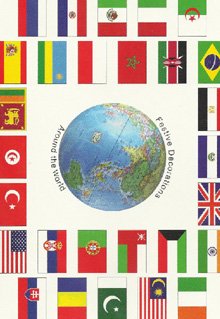Spouses of Ambassadors in Seoul Host "Festive Decorations around World" Exhibition in April
Published on | Source
Celebrations of national festivals take place around the world all year round. To show the nature of these festivities, the Spouses of the Ambassadors in South Korea will hold an exhibition Festive Decorations around the World at the Korea Foundation Cultural Center Gallery.
Advertisement
The exhibition will be open to the public from April 3 to 6 , 2013, from 11 a.m. to 8 p.m. Opening ceremony is on April 2, 2013. A myriad of cultural and artistic manifestations associated with local, religious and secular festivals in the form of amazingly rich and colorful vestments, skillfully crafted objects and structures, musical instruments, delightful gastronomy and others will be shown.
28 countries will participate in this event: Algeria, Brazil, Egypt, El Salvador, India, Ireland, Italy, Kenya, Kuwait, Malaysia, Mexico, Morocco, Oman, Pakistan, Paraguay, Poland, Portugal, Romania, Russia, Rwanda, Serbia, Slovakia, Spain, Sri Lanka, Tunisia, Turkey, United Kingdom and United States of America.
In many countries, weddings are considered very important ceremonial events. The Maghreb countries (Algeria, Morocco and Tunisia) will show traditional, richly embroidered silks, belts, scarves and jewelry used during weddings. Traditional wedding dresses from Kuwait and Oman are very colorful, using a lot of gold and embroidery. Rwandan women wear a silky lightweight MUSHANANA. It is made as a wrap long skirt and a sash that drapes over the shoulder. In Kenya, the bride wears an ankle-length traditional wedding dress decorated with beads and cowrie shells, wearing necklace of colorful beads and long earrings. Egypt will show fine handcrafted silver items offered as presents for weddings.
Thanksgiving festivals are usually associated with harvest season and are a time for joyful family reunions and the sharing of meals and gifts. El Salvador celebrates the Day of the Cross, a fusion of Pre-Hispanic and Catholic traditions to give thanks and to ask for a good harvest. Pakistan celebrates Basant, which is the harvest festival in the spring. In the United States of America, many Thanksgiving traditions are reminders of a bountiful harvest celebration after a very rough winter in 1621. Polands Dozynki, a festival honoring reapers, who, after a good harvest, dance in a joyful procession wearing beautiful regional dresses and straw crowns on their heads. In India, Deepavali or Festival of Lights in October-November marks a joyful beginning and the victory of goodness over evil. On display will be Rangoli colorful designs with flowers or rice and lamps at the entrance of home and temples at Diwali.
Islamic festivities will be captured by decorations used in a traditional Malay wedding from Malaysia. In Turkey, the month of Ramadan (fasting) is celebrated with great joy. Turkey will show an IFTAR dinner, a fast–breaking dinner.
Sri Lanka will show how Vesak, a festival that commemorates the birth of Buddha, his enlightenment and death, is celebrated.
Christmas and Easter are the most important events in the Christian calendar. Every year on 25th December, Christians celebrate the birth of Jesus Christ. Easter celebrates the death and coming to life again of Jesus Christ. The most widely recognized symbol of Easter is the richly painted egg, a symbol of fertility and life. The United Kingdom, Ireland, Poland and Slovakia will show varied traditional Christmas and Easter decorations that incorporate local colors and practices. Portugal will also show Easter decorations and traditional folkloric costumes. Following Orthodox Christian tradition, Romania and Russia consider Easter as a very important holiday.
They will show specially decorated eggs and unique dishes prepared for this occasion. Paraguays Christmas celebration incorporates local customs and tradition especially in the preparation of the Crib. Spain celebrates the Epiphany on the 6th of January, a day when children receive lots of gifts. Italy will show mysterious, romantic masks from the Carnival of Venice. Brazil brings exotic costumes from a samba school in São Paulo that honored 50 years of Korean immigration during the 2013 Carnival. Mexico celebrates life by building Altars for the Dead combining Aztec and Hispanic characteristics, where the living welcomes the souls of the dead. Serbia will show how the Orthodox Christian custom of honoring a patron saint (Slava - a protector of family, village and city) is celebrated.
For details call 02-2151-6514
